
Updated on: September 15, 2024
Short on time? Here’s the final verdict:
- 🥇 Qustodio — Winner in Web Filtering, Screen Time Management, Games & Apps, Activity Reports, and Apps & Ease of Use. It filters content from more predefined categories, its web and app filtering can’t be easily bypassed, it blocks offline apps, lets you set daily and app time limits, its activity reports are far more in-depth, and it's easier to set up.
Qustodio and Bark are both top parental control apps. They both offer essential parental control features like web and app filtering, location tracking, scheduling, and activity reports. Their apps are compatible with all major platforms, including Android, iOS, Windows, and macOS and are very intuitive to use.
But I recommend getting Qustodio over Bark. It filters websites from 25+ predefined categories, its web and app filtering can’t be easily bypassed, it allows you to set daily and app time limits, its activity reports are more detailed, and it’s quicker and easier to get up and running.
Meanwhile, Bark fails to match Qustodio in a handful of areas. While Bark has great social media monitoring tools, it only filters websites from 15+ predefined categories, it’s unable to set screen time limits or time limits for individual apps, its activity reports are extremely vague, and its setup process is a bit more involved. Plus, your kid can disable Bark’s web and app filtering by simply turning off the VPN that Bark uses to manage these features.
I used many metrics to compare Qustodio and Bark, including web filtering, screen time management, location tracking, games & apps management, activity reports, extra features, apps and ease of use, plans and pricing, and customer service.
Qustodio beats Bark overall, but there are some areas where Bark is better. Because of this, I recommend reading the rest of the article to find the best parental control app for your household.
Qustodio vs. Bark: Quick Overview
Web Filtering — Qustodio Has More Robust Web Filtering
Qustodio and Bark both have good core web filtering functions. Both work with all popular browsers, including Chrome, Firefox, Edge, and Safari. They also filter websites either by predefined categories, like Games, Gambling, and Pornography, or by blacklisting specific URLs to block potentially inappropriate or harmful content) on Google, Bing, and YouTube.
But Qustodio has more predefined categories (25+), which gives you more granular control over what your child is and isn’t allowed to see on the web. You can also block all unsupported browsers with a single click. Plus, Qustodio’s web filters cannot be bypassed by using a VPN or a private browser/incognito mode.
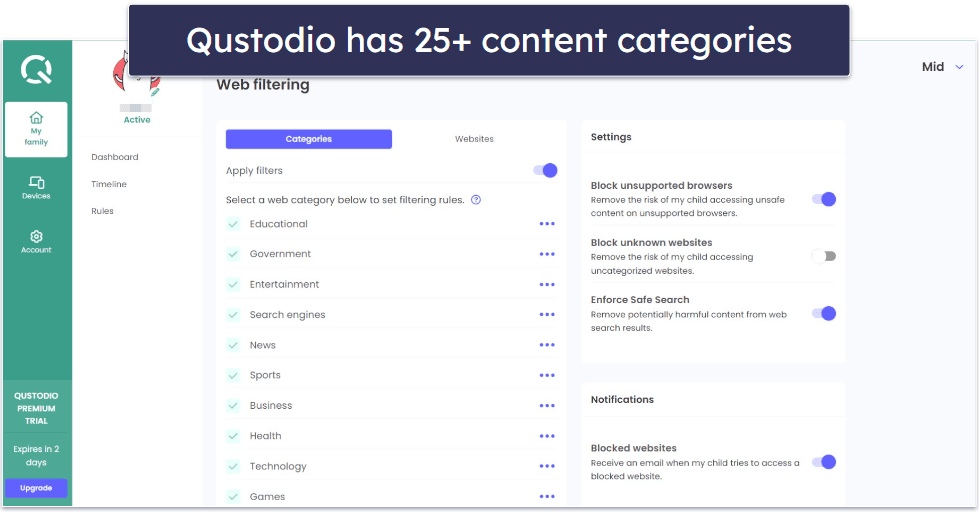
Bark’s 15+ predefined categories cover most of the inappropriate content online, and they’re very easy to toggle on or off, but that’s one of the very few things I like about it.
Its web filtering can be bypassed by using a VPN or a private browser/incognito mode. In order to prevent this from happening, you have to manually block VPN apps that your child might use and make registry edits to disable private browsing/incognito mode on your child’s devices.
Bark doesn’t offer an easy way to block unsupported browsers — again, you have to manually block apps that you don’t want your child to use. What’s more, Bark’s web filtering is very easy to disable. It only takes a few quick taps to turn off the VPN that it uses for this feature. Finally, it doesn’t let your child know when it blocks a website and why. It just prevents that website from loading. This can lead to some unnecessary confusion.

That said, I do really like how Bark lets you create 3 different rulesets (Free Time, School, and Bedtime) and gives you the option to enforce different rule sets during different times of the day and days of the week. You can also manually switch your child to a rule set, such as “School” when you want them to be doing their homework.
Winner (Web Filtering): Qustodio
Qustodio’s web filtering feature is much harder to circumvent. It blocks all unsupported browsers with a click of a button, and your child can’t bypass your rules and restrictions by using a VPN or a private browser/incognito mode. It also filters content from more predefined categories. In contrast, Bark’s web filtering is much easier for your child to get around, but it lets you create different web filters for different times of the day.
Screen Time Management — Qustodio Wins This Round
Qustodio has better screen time management tools. While both parental controls restrict your child’s device usage at certain times of the day, only Qustodio lets you set a daily screen time limit, and it’s more effective at locking down a child’s device.
Qustodio sets daily time limits in 15-minute increments and allows you to set a different daily screen time limit for each day of the week. What I really like is that it lets you decide what happens when your child hits that time limit. The Lock Navigation option blocks internet access on web browsers on desktop devices, non-basic apps on Android devices, and access to the internet on iOS devices. The Lock Device option logs your child out of their desktop device, blocks all non-emergency functions on Android devices, and hides all apps rated age 4 and up on iOS devices.

Its scheduling feature lets you control when your child can and can’t use their devices. One thing I don’t like about it is that it only restricts time to hour-long chunks. I would have liked to have finer control over restricted times.
On the other hand, Bark doesn’t provide the ability to set daily screen time limits and doesn’t lock down your child’s device completely, which is a huge letdown. All it does when it time is up is pause the internet, meaning your child can still use offline apps and access other functions. This is why it’s a better pick for older children.
I was impressed that it can disable access to all online apps and websites during certain times of the day and days of the week with its scheduling feature. And it lets you restrict times in 15-minute increments, which is a lot better than the hour-long chunks you have to work with for Qustodio.
Unfortunately, neither parental control app lets your child request extra screen time from within the kids app.
Winner (Time Limits): Qustodio
I much prefer Qustodio here because Bark lacks the ability to set screen time limits. Qustodio is also more effective at preventing device usage — Bark can only stop online activities. But Bark’s scheduling feature is a bit more flexible than Qustodio’s.
Location Tracking — Bark Is Slightly Better for Location Tracking
Qustodio and Bark both have an excellent location tracking feature that accurately tracks your child in real time. I really like that both apps give you directions to your child’s current location on Google Maps and have a geofencing feature, which allows you to create areas on the map up to 0.12 miles (200 meters) in radius and alerts you when your child enters or leaves these areas. Plus, each keeps a location history of every place your child has been recently.
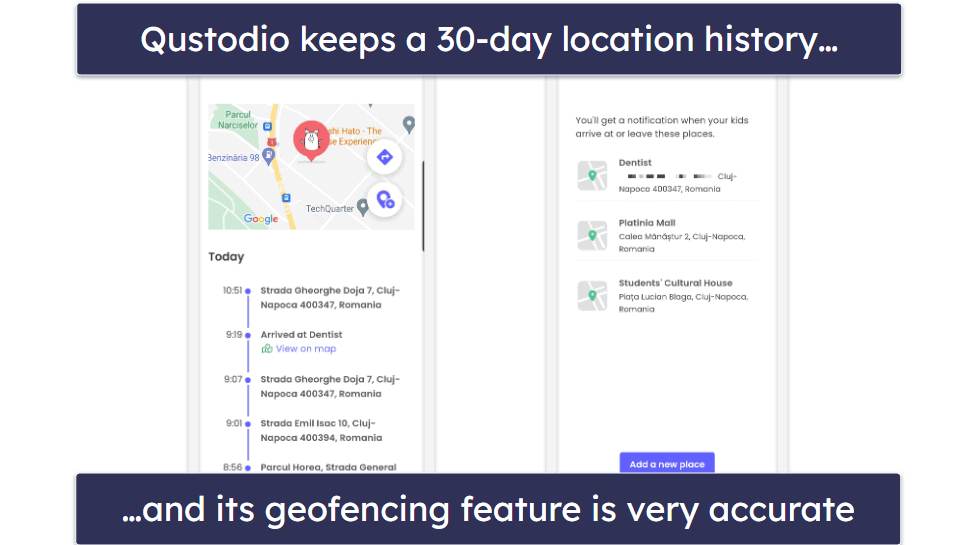
There are just a few minor differences between the two parental controls. For example, Qustodio keeps a location history of your child’s whereabouts for the past 30 days, whereas Bark only keeps a location history of the past 7 days. However, Bark’s location history not only tells you where they were and when but also how long they were in that location for. Bark was also a bit quicker to alert me when I entered or left a geofenced area with my test device — I usually received a notification in about 5 minutes, whereas Qustodio sometimes took up to 15 minutes.

Bark is the only one of the two that lets you request a check-in from your child if tracking their every move is too invasive for you. When you request a check-in, Bark sends a notification to your child’s device and if your child approves it, it’ll send you their physical address, a timestamp, and show you their location on the map.
Winner (Location Tracking): Bark
Both parental controls have good location tracking, but Bark’s is just a bit better. Both accurately tell you your child’s location in real time, give you directions to your child’s location, allow you to create geofenced zones, and keep a location history. But Bark’s location history also tracks how long your child was in each location, its geofencing alerts are more responsive, and it offers a check-in feature as an alternative to real-time location tracking.
Games & Apps — Qustodio Is the Better Choice Overall
Qustodio and Bark both let you block apps, including apps for social media, streaming services, and games, like YouTube, Instagram, TikTok, Netflix, Discord, Reddit, and more. But only Qustodio lets you set time limits on specific games and app usage, and only Bark lets you create different games and app filters for different times of the day and different days of the week. Qustodio’s and Bark’s games and apps management tools work on all major platforms, including Android, iOS, Windows, and macOS.
The way Qustodio’s app filtering works is that it detects an app once your child uses it, and it then adds it to a list on your parental dashboard. From there, you have the option to block it or set a time limit on how long your child spends on that app every day.
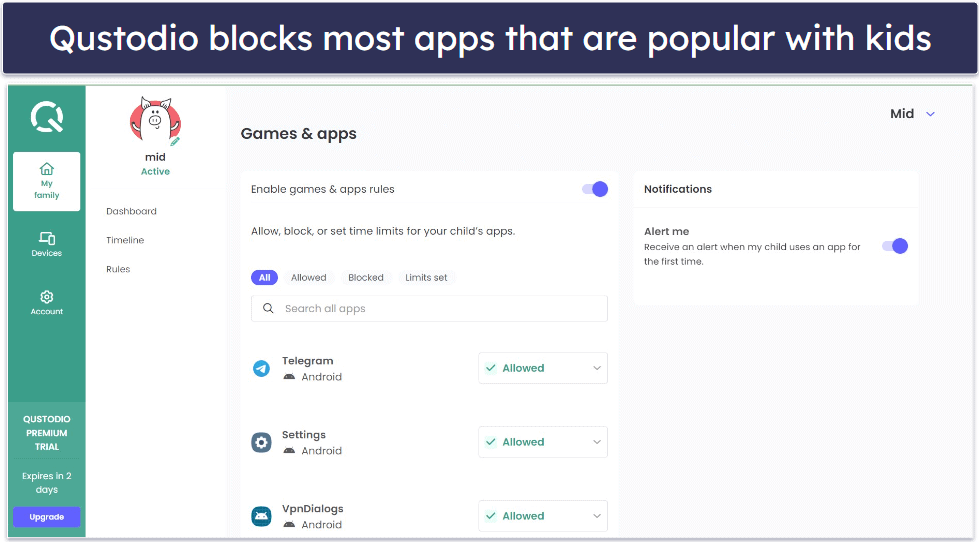
I appreciate that Bark lets you filter apps from 15+ predefined categories, so if you want to block all social media apps, you don’t have to individually block each one. It also lets you set different app filtering rule sets for different times of the day and different days of the week. This makes it more flexible than Qustodio’s app filtering.

That said, Bark’s app filtering also has many issues. First of all, it only blocks an app’s connection to the internet so if your child’s downloaded offline content on Netflix, they’ll still be able to watch it. It’s also unable to set time limits on specific games and apps. Finally, the VPN that handles its app filtering is very easy to disable for a tech-savvy kid.
Winner (Games & Apps): Qustodio
Overall, I think Qustodio has better games and apps management tools. It allows you to block both online and offline apps and to set time limits on specific games and apps. In comparison, Bark only blocks access to the internet, doesn’t set time limits on specific games and apps, and is very easy to bypass. But Bark’s app filtering is more flexible than Qustodio’s.
Activity Reports — Qustodio’s Activity Reports Are More In-Depth
While both parental controls provide activity reports, Qustodio’s are more useful.
Bark’s weekly activity reports only provide general information, such as the number of activities it allowed or blocked in each predefined category and the number of activities that occurred on each of your child’s devices. It doesn’t show you any information about what your child did unless it triggered an alert, and there’s no way to view your child’s browser history or app history.

In contrast, Qustodio keeps activity data for 30 days and offers a comprehensive insight into the websites your child visits, what they type into search engines, how long they spend on each app, the amount of time they spend on each device, when they use their devices the most, and more. All of this information is summarized neatly on its dashboard, but you can also dive into its Timeline tab for more in-depth information. This tab displays every single activity and alert that was recorded and when it occurred.

Winner (Activity Reports): Qustodio
Qustodio wins this round hands down. Bark’s activity reports really don’t give you much actionable information, whereas Qustodio offers in-depth information on your child’s web and app usage, including what they type into search engines, the amount of time they spend on each app, and more. Qustodio also presents this information to you in two different ways: on its dashboard, you’re given a clear and concise summary, and its Timeline tab offers more details on a specific alert or activity.
Extra Features — Both Parental Controls Have Great Extra Features
Qustodio and Bark both include plenty of extra features. But they have very different strengths and weaknesses. Qustodio is better at YouTube monitoring, call and SMS monitoring, and is the only one of the two with uninstall protection and a panic button. On the other hand, Bark is better for social media monitoring.
Qustodio’s YouTube monitoring feature is superior. Qustodio lets you see everything your child searches and watches, whereas Bark only shows you your child’s searches and video views on YouTube if they contain potential issues. With Qustodio, you’re able to set a time limit on the YouTube app, but not with Bark.
Qustodio monitors calls and SMS. It logs your child’s call history, lets you block incoming or outgoing calls, and allows you to read every text message. Bark doesn’t log call history, can’t block calls, and only shows you texts containing problematic content.
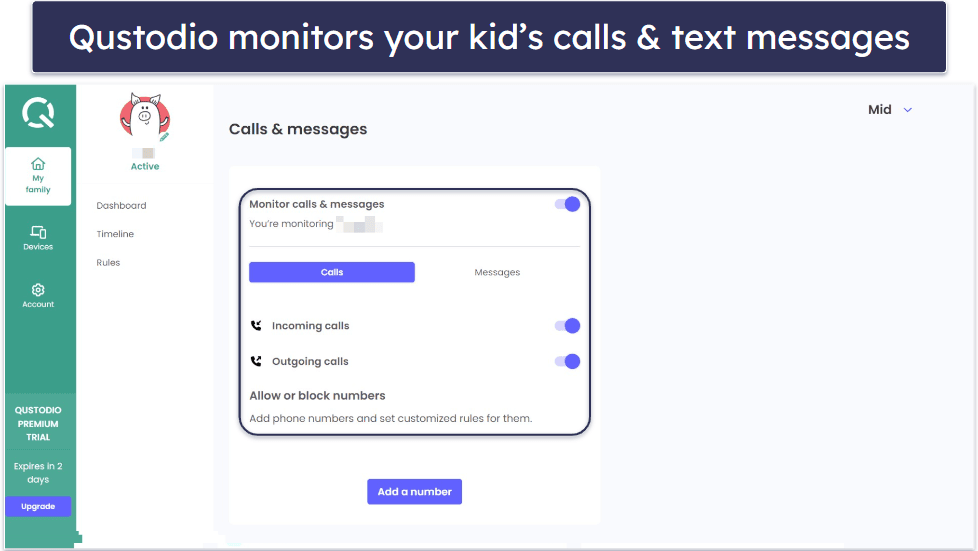
Lastly, only Qustodio includes uninstall protection and a panic button. The former prevents your child from uninstalling Qustodio without your login credentials, so they can’t bypass your rules and restrictions. The latter is a button on its Android app that, when pressed, sends an alert to all trusted contacts via text and email.
Bark stands out for its ability to monitor social media content. It scans 30+ social media platforms and apps, including Snapchat, Instagram, TikTok, and Twitter for 15+ categories of potential issues, such as Bullying, Depression, Sexual Content, and Violence, and shows you the offending content if it finds any, so you can have a chat with your kid about it. This unique feature monitors your child’s DMs, posts, photos, videos and/or comments on these apps and sites.

This same content monitoring feature also works for emails, as well as photos and videos stored on your child’s devices. Qustodio doesn’t monitor the content on your child’s social media.
Winner (Extra Features): It’s a tie
It’s hard to call a winner for this category. Which one you prefer very much depends on what you’re looking for in a parental control app. Qustodio has better YouTube monitoring, Call & SMS monitoring, and can’t be easily removed due to its uninstall protection feature. But Bark’s content monitoring feature is very impressive, alerting you of potential issues in your child’s DMs, posts, photos, videos, and/or comments on 30+ social media apps. This content monitoring also works for emails, photos, and videos on your child’s devices.
Apps & Ease of Use — Qustodio’s Apps Are More Streamlined
Both parental control apps are compatible with all major platforms, including iOS, Android, Windows, and macOS, and have a web app, so you don’t need to install a parent app to monitor your kids. Qustodio monitors Chromebook and Kindle, but Bark is compatible with the Amazon Fire app and has router support through Bark Home, which lets it monitor all router-connected devices in your household, including devices that are not normally compatible with parental controls.
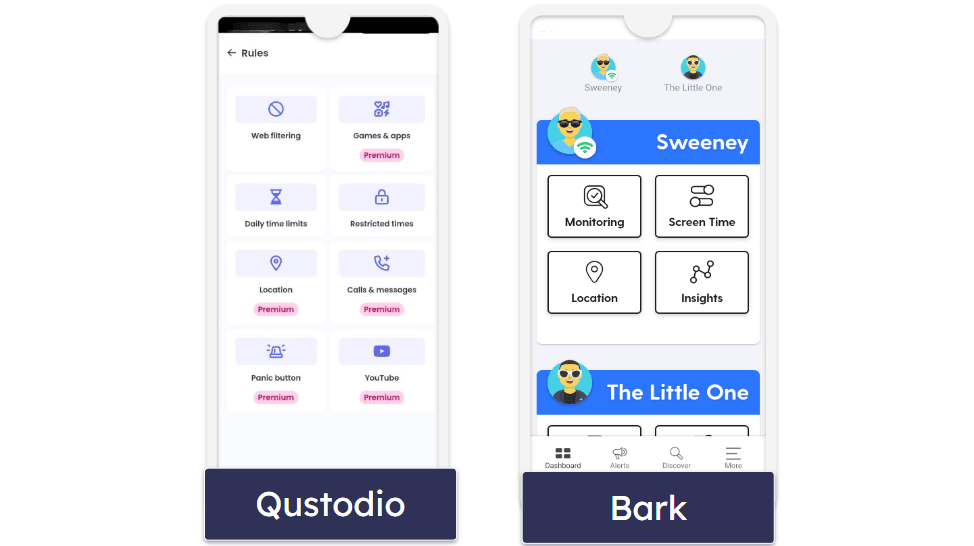
Qustodio is pretty easy to set up. It shouldn’t take longer than 5 minutes to do it on each of your kids’s devices.
Bark’s setup takes a bit longer because you need to log into your child’s account for every app and platform you want to monitor. I also don’t like that you have to physically connect your child’s device to your own for the initial setup for iOS and I think turning on the location tracking feature is tricky — you have to go into your kid’s setting and give it permission as the app doesn’t request one during the installation process like Qustodio and most other parental control apps.
I found both apps to be very intuitive — creating new rules and restrictions is quick and easy and you’ll have no problems using either even if you aren’t very tech-savvy. I also didn’t experience any bugs in my tests.
Winner (Apps & Ease of Use): Qustodio
I gave this round to Qustodio because it’s quicker and easier to set up. Both parental controls have intuitive and bug-free apps, but Bark’s set up process is less straightforward and can take much longer. That said, Bark is capable of monitoring more types of devices — it has an Amazon Fire App and offers router support, which lets it monitor devices that most parental controls can’t, such as gaming consoles and smart TVs.
Plans & Pricing — Both Parental Controls Have Good Plans and Pricing
Both Qustodio and Bark offer 2 affordable plans and let you monitor unlimited devices. The only exception is Qustodio’s cheaper plan that only monitors 5 devices.
Question has a Basic and Complete paid plan. The Basic plan costs $4.58 / month and has all of the features included in the free plan plus app filtering, location tracking, and a Panic Button (Android only). The Complete plan costs $8.33 / month and allows you to monitor an unlimited number of devices. It has all of the features included in the Basic plan, plus games & apps time limits, YouTube monitoring, saved places alerts, and calls & SMS monitoring.
Qustodio doesn’t have monthly plans, so you have to commit to a year-long subscription. It’s also more expensive than most other parental control apps. That said, I think it’s well worth the price given how much value it provides. You can try out Qustodio yourself risk-free by taking advantage of its 3-day free trial and its 30-day money-back guarantee. It accepts payment via credit/debit cards and PayPal.
Qustodio has a free plan, too, but it’s pretty limited. It only lets you monitor 1 device and only includes its screen time monitoring, daily time limits, restricted time periods, and web filtering features. It doesn’t have features like app filtering, location tracking, and YouTube monitoring.
Bark’s Bark Jr. ($60.00 / year) and Bark Premium ($14.00 / month) both include all of the same features, except only Bark Premium has its content monitoring feature that allows you to monitor your kid’s social media, which is one of Bark’s main selling points.
It also offers 2 devices: Bark Home ($6.00 / month) and the Bark Phone ($29.00 / month). Bark Home is a physical device that attaches to your router and allows you to monitor all router-connected devices, even those that don’t normally support parental controls, such as gaming consoles and smart TVs. The Bark Phone is an Android smartphone with Bark pre-installed on it that includes features you don’t get on a regular Android with Bark, such as the ability to block your kid from deleting messages on their phone, managing their calls and contacts, locking your kid’s device, and setting time limits for specific apps.
You can try Bark risk-free with its 7-day free trial, but unlike Qustodio, it doesn’t back its plans with a money-back guarantee. Bark accepts payment via credit/debit cards.
Winner (Plans & Pricing): It’s a tie
Both parental controls have solid plans and are similarly priced. Qustodio has a free plan, and provides more overall value, and all of its plans come with a 3-day free trial and 30-day money-back guarantee. Bark offers a 7-day free trial and no money-back guarantee, but Bark Premium offers a unique Content Monitoring feature, and Bark Home allows you to monitor devices that most parental controls can’t, such as Xbox and Roku.
Customer Support — Both Have Excellent Customer Support
Qustodio and Bark both provide good customer support. They offer support via email, phone, an in-depth support library, which includes setup tutorials, FAQs, and troubleshooting guides. Unfortunately, neither has live chat support.
The support libraries for both parental control apps are very comprehensive. They include a search function to make it easier to find the answers you’re looking for and I really like that most of the articles in their support libraries are also packed with visual aids, including videos and screenshots, which is super helpful.
I emailed both customer support teams at different times of the day to test their responsiveness and I was pleasantly surprised that I always received a reply within 24 hours. The support reps I spoke to were also very knowledgeable and were always able to address my questions and concerns.
Qustodio’s phone support is only available to US users with the Complete plan, which is a bit of a letdown, but its phone support reps are very knowledgeable and friendly. On the other hand, Bark’s phone support is available to all customers with any subscription in any country where you can get it. That said, Bark doesn’t offer typical phone support — you can only schedule a call with a rep via its chatbot if you need help setting things up (you’ll receive a call from a support rep at the scheduled time).
Winner (Customer Support): It’s a tie
Qustodio and Bark both offer excellent customer support. Both have comprehensive support libraries, but if you need more assistance, you can also contact their support teams via email or phone. Their support teams are very responsive and know their stuff.
Overall Winner: Qustodio
Qustodio is great for web and app filtering and screen time management. One of my favorite things about it is that its web and app filters can’t be easily bypassed, not even by using a VPN or private browser, and it’s able to block both online and offline apps. It also offers comprehensive activity reports, a panic button, uninstall protection, and the ability to monitor your child’s calls and SMS messages.
Bark stands out for its unique Content Monitoring feature, which allows you to monitor your child’s text messages, emails, photos, videos, and 30+ social media platforms for potential issues. It also has excellent scheduling and location-tracking features.
However, I think Qustodio is the better overall parental control app. Its core features, like web and app filtering and screen time management are a lot better, its rules and restrictions are harder to circumvent, and its activity reports provide much more useful information.
Frequently Asked Questions
Is Bark better than Qustodio?
No, I think Qustodio is the better parental control app overall. Qustodio filters websites from more predefined categories (25+ versus Bark’s 15+), its web and app filters can’t be easily bypassed like Bark’s, and it blocks offline apps which Bark can’t do. It also allows you to set daily and app time limits, whereas Bark only applies different filters for apps and sites for the day and its activity reports provide much more detailed and actionable information.
Which has better call and SMS monitoring — Qustodio or Bark?
Qustodio is the better choice for call and SMS monitoring. Only Qustodio has a call & SMS monitoring feature that lets you see your child’s call history, block incoming or outgoing calls, and read every one of your child’s SMS messages. For comparison, Bark only shows you text messages that contain potential issues.
Which is better for screen time management — Qustodio or Bark?
Qustodio is superior to Bark for screen time management. While both Qustodio and Bark offer scheduling tools to restrict device usage at certain times, only Qustodio allows parents to set daily screen time limits in 15-minute increments.
Qustodio also provides more options for what happens when your child’s time is up: you can block internet access or lock your child out of their devices entirely. In comparison, Bark only pauses the internet, so even during restricted times, your child can still use offline apps. That said, its scheduling feature is more flexible than Qustodio’s — it allows you to adjust restricted times in 15-minute increments whereas Qustodio makes you work with hour-long chunks.
Which has better location tracking — Qustodio or Bark?
Bark offers slightly better location tracking than Qustodio. Both apps can accurately track your child in real-time, provide directions to their location on Google Maps, offer geofencing features, and maintain a location history, which tracks where your child has been recently.
Bark’s location history feature is more detailed. It tells you not just where your child was but also how long they spent in each location. Its geofencing alerts are also more responsive, and it includes an alternative to real-time location tracking, which allows you to request a check-in from your child — this sends you their physical address, a timestamp, and shows you their location on the map.